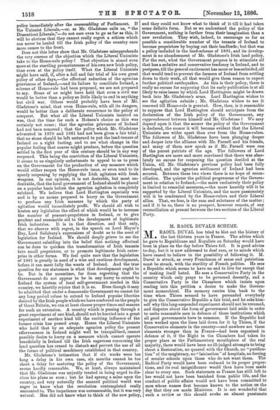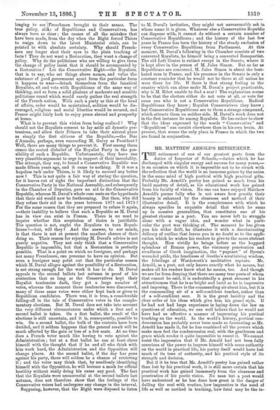M. RAOUL DUVAL'S SCHEME.
MRAOUL DUVAL has tried to blot out the history of
• the last thirteen years in France. The advice which he gave to Republicans and Royalists on Saturday would have been in place on the day before Thiers fell. It is good advice to-day, but it is now addressed to deaf ears, or to minds which have ceased to believe in the possibility of following it. M. Duval is struck, as every Frenchman of sense and patriotism must be struck, with the sterility of French politics. He gees a Republic which seems to have no end to live for except that of making itself hated. He sees a Conservative Party in the country which only prays to be governed decently, and a Conservative Party in the Chambers which insists upon reading into this petition a desire to make the Govern- ment monarchical. His memory carries him back to the time when Thiers seemed to have persuaded everybody to give the Conservative Republic a fair trial, and he asks him- self why this long-suspended experiment should not be resumed, and disputes about the form of government laid aside in order to unite reasonable men in defence of those institutions which all good governments have in common. If the Republic had been worked upon the lines laid down for it by Thiers, if the Conservative elements in the country—and nowhere are these elements stronger than in France—had been organised in defence of it, if the Right in the Chambers had taken its proper place as the Parliamentary mouthpiece of the real majority, there would have been no ill-judged attempts to bring about a Restoration, no quarrel with the Church, no "purifica- tion" of the magistracy, no "laicisation " of hospitals, no forcing of secular schools upon those who do not want them. The Radical Party would have been reduced to its proper propor- tions, and its real insignificance would then have been made clear to every one. Such statesmen as France has still left to her would not have been banished from public life, and the conduct of public affairs would not have been committed to men whose names first become known to the nation on the day that they are made Ministers. It is not wonderful that such a review as this should evoke an almost passionate
longing to see Frenchmen brought to their senses. The true policy, alill, of Republicans and Conservatives, has always been so clear; the causes of all the mistakes that have been made, from the day when the Right forced Thiers to resign down to the latest Ministerial crisis, can be pointed to with absolute certainty. Why should French- men any longer shut their eyes to the plain teaching of facts ? They do not want a Restoration, they want a change of policy. Why do the politicians who are willing to give them the change of policy insist that it should be accompanied by a Restoration ? Let the Conservative Right—the Royalists, that is to say, who set things above names, and value the substance of good government apart from the particular form it happens to wear--detach themselves from the fanatical Royalists, sit and vote with Republicans of the same way of thinking, and so form a solid phalanx of moderate and sensible politicians round which would surely gather the real strength of the French nation. With such a party as this at the head of affairs, order would be maintained, sedition would be dis- couraged, religious and social liberties would be secured, and Franc* might fairly look to enjoy peace abroad and prosperity at home.
What is to prevent this vision from being realis3d ? Why should not the Royalists consent to lay aside all dynastic pre- tensions, and allow their Princes to take their natural place as simply the first citizens of the Republic,—the Due d'Aumale, perhaps, even succeeding M. Gre'vy as President? Well, there are many things to prevent it. First among them comes the rooted disbelief of the Royalist Party in the pos- sibility of such a Republic. Unfortunately, they have one very plausible argument to urge in support of their incredulity. The attempt, they say, to found a Conservative Republic was made fifteen years ago, and it came to nothing. If it was a hopeless task under Thiers, is it likely to succeed any better now ? This is not quite a fair way of stating the question, for it leaves out of sight the important distinction that the Conservative Party in the National Assembly, and subsequently in the Chamber of Deputies, gave no aid to the Conservative Republic, whereas M. Duval's whole case rests on the hypothesis that their aid would now be forthcoming. But then, why did they refuse their aid in the years between 1871 and 1873? For the same reason that they are prepared to refuse it again, —their inability to believe that such a Republic as M. Duval has in view can exist in France. There is no need to inquire whether this scepticism of theirs is justifiable. The question is not, ought the Royalists to turn Repub- licans ?—but, will they? And the answer, to our minds, is that there is not at present the smallest chance of their doing so. Their reason for rejecting M. Duval's advise is not purely negative. They not only think that a Conservative Republic is impossible, but that a Restoration is perfectly possible. That is a point on which no foreigner, and perhaps not many Frenchmen, can presume to have an opinion. But even a foreigner may point out that the particular reason which M. Duval alleges against the possibility of a Restoration, is not strong enough for the work it has to do. M. Duval appeals to the second ballots last autumn in proof of his contention that so long as the Conservatives kept their Royalist tendencies dark, they got a large number of votes, whereas the moment these tendencies were discovered, many of these same votes were either kept back or given to Republican candidates. There was, it is true, a considerable falling-off in the tale of Conservative votes in the comple- mentary elections. But M. Duval does not take into account the very different circumstances under which a first and a second ballot is taken. On a first ballot, the result of the elections is still uncertain, and it is, consequently, possible to win. On a second ballot, the bulk of the contests have been decided, and it seldom happens that the general result will be much affected by the gain or loss of a few seats. At no time does a French voter much like having to vote against the Administration ; but at a first ballot he can at least cheer himself with the thought that if he and all who think with him work hard, the Administration and the Opposition will change places. At the second ballot, if the day has gone against his party, there will seldom be a chance of retrieving it ; and the voter may think that, by needlessly identifying himself with the Opposition, he will become a mark for official hostility without really doing his cause any good. The fact that the Royalists were unsuccessful at the second ballots last autumn, does not therefore show that the feelings of the Conservative voters had undergone any change in the interval.
Supposing, however, that the Right were disposed to listen to M. Duval's invitation, they might not unreasonably ask in whose name it is given. Whatever else a Conservative Republic can dispense with, it cannot do without a certain number of Conservative Republicans ; and the history of the last few years in France has been the history of the steady exclusion of every Conservative Republican from Parliament. At this moment, M. Duval's following in the Chamber consists of two converted Royalists, he himself being a converted Bonapartist. The old Left Centre is extinct except in the Senate, where it is kept alive in the person of M. Jules Simon. But so far as Republicans are concerned, M. Jules Simon is about the best- hated man in France, and his presence in the Senate is only a constant reminder that he would not be there at all unless he were there for life. If there is that strong feeling in the country which can alone make M. Duval's project practicable, why is M. Ribot unable to find a seat? The explanation seems to be that the electors either do not vote at all, or vote for some one who is not a Conservative Republican. Radical Republicans they know ; Royalist Conservatives they know ; but Conservative Republicans are to them a strange compound, which attracts them on neither side. M. Duval's work does not in the first instance lie among Royalists. He has rather to show that the ideas expressed by the words " Conservative " and "Republican" can coexist elsewhere than in his own brain. At present, that seems the only place in France in which the two are found in conjunction.



































 Previous page
Previous page